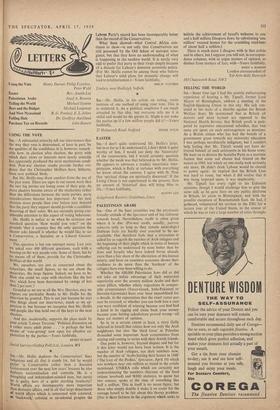Using the Vote Henry Durant, Philip Toynbee,
Peter Wyld
Easter Rev. Austin Lee Palestinian Arabs Josef A. Rosen?: Telling the World Michael Sissons Beer and the Budget Michael Leapman And Now Nyasaland R. G. Pentney, E. L. Johns Palling Hair Dr. Geoffrey Auckland Purchase Tax on Records John Bassett USING THE VOTE SIR,—A substantial minority tell our interviewers that the way they vote is determined, at least in part, by the qualities of the candidates. It is, however, remark- able how, in election after election, the party with which their views or interests most nearly coincide has apparently produced the most meritorious candi-
date. Post-war election results provide further evi- dence that the Christopher Hollises have, hitherto, been rare political birds.
But Mr. Hollis may draw comfort from the use of the past tense. There are signs in our recent work that the two big parties are losing some of their grip. As more electors become aware of the similarities rather than the differences between the main parties, party considerations become less important. At the next election more people than ever before may demand that the party they support should provide a candidate deserving of their votes. We are currently giving con- siderable attention to this aspect of voting behaviour.
Mr. Hollis is unfair to us when he criticises our standard question 'How would you vote?' on the grounds 'that it assumes that the only question the elector asks himself is whether he would like to see a Conservative, a Socialist, or a Liberal Govern- ment. .
This question is but one amongst many. Last year we asked over 400 different questions, each with a bearing on the way people vote. Some of them, but by no means all of them, provide for the Christopher Hollises of this world.
We, ourselves, are just , as concerned about the minorities, the small figures, as we are about the Majorities, the large figures. Indeed, we have to be. How else could we cope with elections like the last two, which have been determined by swings of less than 2 per cent.?
Grateful as we are to all the Mrs. Harrises, may we express our particular thanks to Mr. Hollis for the interview he granted. This is not just because he says nice things about our interviewer, much as we ap- preciate it; but because we recognise that Mr. Hollis and people like him hold one of the keys to the next election.
And this, incidentally, supports the pleas made by your article `Laissez Toryism.' Political discussion on a rather more adult plane . . .' is perhaps the best means of 'vote-getting' now open for effective ex- ploitation by the parties.—Yours faithfully,
HENRY DURANT
Social Surveys (Gallup Poll) Ltd., London, W1


































 Previous page
Previous page